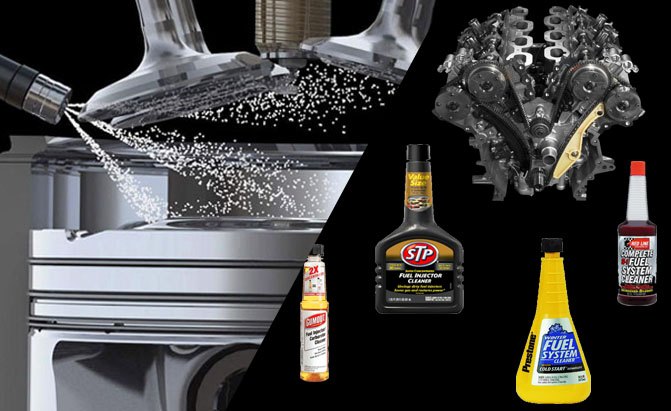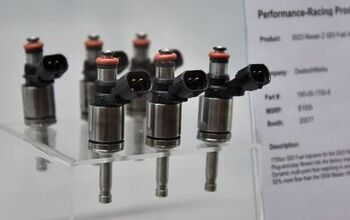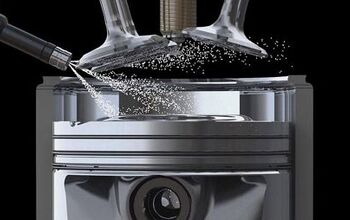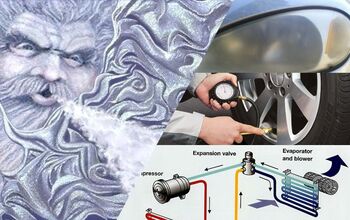Should I Use Fuel Injector Cleaner?

You’re walking down the aisle of your local auto-parts store and you happen to notice the shelf full of fuel-system cleaners. They might be nestled between oil additives and those bottles of goo designed to quiet noisy engines. The packaging looks nice and the price is usually right, but is this stuff a necessary maintenance item or vehicular snake oil?
“That’s a question that I get asked quite frequently,” said Duane C. Richardson, technical service engineer with 3M’s automotive aftermarket division. To concisely answer this query he said, “You’re going to notice some difference, I can almost guarantee it.” This is especially true if you go on a lot of short trips in cold temperatures, driving conditions that can exacerbate the formation of carbon deposits inside an engine, harmful build up that robs your car or truck of performance and fuel economy.
Is Fuel-System Cleaner Necessary?
Responding via e-mail, Chris Barker, Tech Services Manager at Royal Purple echoed what Richardson noted. He said, “Fuel is chemically less stable than ever before. This is due, in large part, to the use of ethanol as an octane-boosting ingredient.” Elaborating he said, alcohol oxidizes and emulsifies to form non-combustible byproducts.
SEE ALSO: 15 Best Fuel Injector Cleaners
Over time these can build up in fuel injectors, on the backsides of intake valves and throughout an engine’s combustion chamber. “The result [of this] is loss of engine performance, reduced fuel economy, increased emissions, hard starts, etc.,” Barker said.
Cleaners can help eliminate these harmful deposits when employed regularly. “The average consumer benefits from the use of these fuel additives [about once a year],” Richardson said. Fortunately they’re about as easy to use as a bottle of ketchup; they simply get poured right into a full tank of gas.
And really all drivers should be running them. Barker said, “Especially those who use gasoline that contains ethanol,” which is pretty much everybody these days.
SEE ALSO: Everything You Need to Know About Fuel Injector Cleaners
Richardson said that according to 3M’s data the typical motorist travels between 12,000 and 13,000 miles annually in a variety of conditions. But if you’re someone that goes short distances, if you live in a frigid climate or do a lot of stop-and-go driving, “We recommend one bottle every three thousand miles,” he said. Situations like these can exacerbate the formation of deposits.
Carbon, the Building Block of Deposits
When it comes to harmful buildup carbon is enemy number one and the unfortunate truth is that this gunk is unavoidable. According to Richardson it’s “a byproduct of the use of gasoline.” He said you’re going to have carbonaceous deposits no matter how you drive it’s just a question of how quickly they form.
He likened the inside of a car or truck’s engine to an oven. If you make one batch cookies chances are things will remain spotless in there. But if you go five years without cleaning it crud will gradually build up, resulting in a nasty mess. “That’s kind of what happens on the inside of your vehicle,” said Richardson.
Engines thermo-cycle from ambient to operating temperature and back again, time, after time, after time. This constant change can lead to deposits but it’s hardly the only culprit. Exhaust-gas recirculation (EGR) and positive crankcase ventilation (PCV) systems can exacerbate carbon build up, as can direct fuel injection.
SEE ALSO: Is Carbon Buildup a Problem with Direct Injection?
As Barker mentioned, another big factor is the gasoline itself. Richardson said there’s a lot variation in fuel quality. Running low-grade petrol can lead to more deposits than, say, a top-tier gas, which contains more detergents.
How Does it Work?
In addition to solvents and other components one of the main ingredients in fuel-system and fuel-injector cleaner is a fancy-sounding chemical called polyetheramine, also referred to as PEA for short. “It’s really the only one – for carbonaceous deposits – that’s effective for the environment we’re using it in,” Richardson said.
Think of it as oven cleaner or laundry soap. “These fuel detergents get down in the deposits,” said Richardson, breaking them into “very small particulates” that pass through the engine’s exhaust system.
Put another way Barker said, “PEA detergents fully solubilize deposits so they can easily be washed away and burned through the normal combustion process in the engine.” But that’s not all. He also noted, “Due to the surface active nature of PEA detergents, they are also more effective in preventing the formation of additional deposits than other types of fuel-additive detergents.”
According to Barker, “Lower quality, older technology detergents can cause deposits to be removed in small pieces that can clog injectors and get lodged in catalysts and exhaust valve seats.” He recommends premium fuel cleaners that contain PEA.
The Result
The benefits of regularly using these products are numerous. Drivers can expect smoother-running, more powerful-feeling engines; small gains in efficiency are also common. Additionally Barker said that in engines and fuel systems that contain deposits these cleaners can give drivers smoother idling, enhanced throttle response and reduced cranking time.
Richardson said that consumers often assume a gradual loss of performance and economy occurs simply because their vehicles get older. This is not necessarily true. “A lot of that is attributable to carbon deposits,” he said, something that fuel-system cleaners can help to alleviate.
SEE ALSO: Which Stations Sell the Best-Quality Gasoline?
Of course there are plenty of other variables in play. Richardson noted that motorists should always keep up on preventative maintenance items, changing spark plugs, engine oil and air filters as required. Also, he said owners of newer cars and trucks will likely not notice any benefits when using fuel-system cleaner because carbon deposits won’t have had a chance to form in these factory-fresh engines.
Safe and Sound
Reiterating what he said earlier Richardson noted, “If you’re going to use gasoline you’re going to have these (carbon) problems,” which is why fuel-system cleaners can be beneficial. Fortunately for drivers they’re affordable and totally safe.
“We’ve been selling these fuel-tank additives since about 1990,” said Richardson. “And I can’t think of one problem that I’ve been able to link to the use of the product.” They’re even beneficial in older, carbureted engines. But a word of wisdom if you’re going in for a smog test. Richardson said make sure you’re not running fuel-system cleaner at that time because it could result is slightly higher emissions.
Check out our Tips and Advice section for more stories like this.

Born and raised in metro Detroit, Craig was steeped in mechanics from childhood. He feels as much at home with a wrench or welding gun in his hand as he does behind the wheel or in front of a camera. Putting his Bachelor's Degree in Journalism to good use, he's always pumping out videos, reviews, and features for AutoGuide.com. When the workday is over, he can be found out driving his fully restored 1936 Ford V8 sedan. Craig has covered the automotive industry full time for more than 10 years and is a member of the Automotive Press Association (APA) and Midwest Automotive Media Association (MAMA).
More by Craig Cole




































Comments
Join the conversation
Two mechanics? TWO? Wow. You really did your research. ??????
I used an engine cleaner and then bought the same brand of fuel injection cleaner.....which seems to be causing engine to stall. Can anyone tell me if it's safe to use in a 2009 Kia Rio LX base?